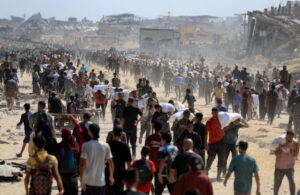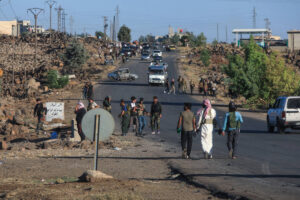
The National Interest Foundation Newsletter
Issue 294, July 25, 2025
Welcome to our NIF Newsletter. In this week’s edition, we provide analysis regarding the widespread famine in Gaza and the total absence of the international community, while also delving into the carnage in Suwayda and the future of Syria-Israel relations.
Editor: Bassam Tarbush
Widespread Famine in Gaza and the Total Absence of the International Community

Humanitarian organizations have recently warned that Gaza is experiencing unprecedented levels of malnutrition. (Photo from Reuters)
The deepening hunger crisis in Gaza has reached calamitous new levels over the preceding weeks, with health officials expressing that malnutrition is now killing civilians at an alarmingly higher rate than at any point since the onset of the 21-month-long Gaza War. Despite verbal denunciation of the dire shortages of humanitarian relief and the reprehensible repeated Israeli mass killings of civilians seeking aid, no action has been taken to significantly increase the flow of much-needed supplies. Earlier this week, more than two dozen countries condemned Israel’s continued inhumane killing of civilians and its denial of essential humanitarian assistance, yet there has been a complete lack of concrete actions and measures taken to put an end to these egregious human rights violations and war crimes. Furthermore, Israel’s use of starvation as a weapon of war and the militarization of aid has meant that even attempts at collecting humanitarian supplies has become a deadly task for Gazans. United Nations agencies estimate that at least 1,000 civilians have been killed by Israeli forces while trying to access food in recent months – with nearly all of these taking place at distribution sites operated by the universally criticized Gaza Humanitarian Foundation (GHF). Prior to Israel’s politicized aid distribution takeover in May, international relief organizations independently operated several hundred sites across Gaza where civilians could access food, but since then, increasingly desperate civilians have been deliberately targeted and killed in deplorable numbers at GHF hubs.
In light of what has unfolded in recent weeks, the United Nations has warned about the rapidly deteriorating humanitarian conditions in Gaza. UN officials have highlighted the growing number of civilians arriving at hospitals and health facilities suffering from severe malnutrition. In fact, medical personnel on the ground in Gaza have recently recounted the troubling levels of this that they have witnessed, particularly among children, noting that it has significantly worsened during the past few weeks. Surgeons have also lamented that this has reached a point where many patients are dying because malnutrition is preventing their wounds from properly healing. The scale of food insecurity has directly impacted aid and medical workers too, with humanitarian agencies and hospitals conveying that their own staff are suffering from increased levels of malnutrition. Media outlets such as Reuters and AFP have even stated that their journalists are at risk of starvation. This week, the UN World Food Program declared that Gaza’s hunger crisis has reached what they labeled as “new and astonishing levels of desperation,” outlining that a third of the civilian population is going days without food due to the current conditions. Despite all of this, humanitarian officials continue to decry the lack of tangible global efforts to address the blatant Israeli disregard for international law that has resulted in these harrowing circumstances across Gaza.
On top of impeding humanitarian relief efforts, Israeli forces are actively attacking facilities tied to them as well. Earlier this week, Israeli strikes were carried out on World Health Organization (WHO) buildings in central Gaza, including its main warehouse and a staff residence. Regrettably, it is precisely because of the international community’s inaction and failure to implement meaningful punitive measures that Israeli forces continue to feel emboldened to commit these types of appalling violations. In spite of the Israeli attacks, the WHO did remark that not only would it remain in central Gaza, but the organization planned to expand its critical operations and medical services. All told, the strikes on the WHO facilities did not come as a surprise to those that have been closely following the behavior of Israeli forces during the course of the Gaza War, as all forms of infrastructure – civilian, humanitarian, medical, and otherwise – have been indiscriminately targeted by destructive bombardment and attacks.
While sentiment and public opinion around the world has grown increasingly critical of Israel’s conduct in Gaza, there is a need for concrete and robust global actions to reflect this in order to put an end to these violations and help alleviate the ever-deteriorating humanitarian crisis. Condemnations and joint statements from various governments denouncing these continuous abuses have clearly not deterred them from repeatedly taking place. Words are not enough, and should be coupled with impactful measures such as arms embargoes, sanctions, and the suspension of ties and agreements. With the recent worsening of humanitarian conditions in Gaza, the urgency for this has only heightened. As Israel’s biggest supporter, the United States bears a great degree of culpability in what has taken place. Additionally, a host of Arab countries deserve blame as well for doing nothing to pressure the U.S. and Israel, especially Egypt – due to its proximity to Gaza – and those that have signed on to the Abraham Accords yet fail to hold Israel accountable for its pattern of heinous war crimes, human rights abuses, and violations of international law.
Carnage in Suwayda and the Future of Syria-Israel Relations

What transpired in Suwayda and Israel’s foreign interference has highlighted the significant challenges facing the new Syrian government in Damascus. (Photo from AFP)
The recent outbreak of violence in Suwayda last week has shed light on Syria’s fragile transition and the major challenges posed to the new government. This is especially the case given the nascent nature of the political transition, and as the government in Damascus tries to assert its authority and stability across the country after the ousting of the Assad regime back in December. The circumstances were further complicated as a result of destructive foreign intervention and attacks carried out by Israel, which was understandably condemned for its attempts to exacerbate the violence and undermine the new Syrian government. Even in the midst of ceasefire agreements and efforts to restore order, the humanitarian situation in Suwayda remains critical, with thousands displaced and dealing with shortages of food, water, and medical supplies. Experts have outlined that what unfolded in Suwayda demonstrates the complexities that the new government faces in potentially seeking to establish centralized control due to various local and regional considerations. For many, the vital question that remains to be seen is what this entails for Syria moving forward as it continues to navigate its delicate political transition.
One of the most critical things that is now needed is a sense of accountability in the aftermath of the atrocities that were committed in Suwayda. As such, it is no surprise that the Syrian government recently announced that it had opened investigations into suspected extrajudicial killings, vowing to hold all involved accountable, even members of its own forces. In order to bolster its legitimacy, the new regime needs to conduct a swift, credible, and transparent investigation into the violence which resulted in the killing of an estimated more than 1,400 people. Authorities have expressed commencing an urgent investigation to identify those involved in the violations, and that a committee would determine the affiliation and background of these perpetrators. As some analysts have pointed out, Syrian officials’ remarks regarding their commitment to safeguard all citizens is one thing, but it will all come down to how the new government behaves since their actions will speak louder than words for the minority groups in the country.
When clashes in Suwayda between Druze and Bedouin groups erupted, the Syrian government sent troops into the southern province in an effort to restore order, even reportedly notifying Israel in advance so as to emphasize that the move was not intended as a threat. Despite this, Israel – which has long used the guise of “protecting the Druze” as a political tool to try and justify aggression – viewed this as an opening to initiate attacks, even as the very community it claims to protect largely rejects Israeli intervention and stresses that solutions should come from within the internal Syrian state. Exemplifying the scale of the denunciation regarding the Israeli attacks on Syria is the fact that they were even met with displeasure among President Trump and other senior U.S. officials. It was revealed that Israel’s actions alarmed and blindsided many in the Trump administration, widening their concerns over its policies across the region. Secretary of State Marco Rubio framed the Israeli attacks as a dangerous hindrance to the prospects of building a peaceful and stable Syria, with some speculating that public criticism such as this is likely meant as a warning to the Netanyahu government that the White House is growing frustrated with its bellicose actions.
As for the future of Syria-Israel relations, much remains unclear, however a meeting between U.S., Israeli, and Syrian officials did take place yesterday in what was described as an effort to reach security understandings regarding the situation in southern Syria and prevent crises such as the one which transpired last week. While the potential for continued dialogue exists, several key factors are likely to influence the trajectory of this, including Israel’s harmful interference in Syria’s internal affairs and whether or not the new government in Damascus is able to maintain stability. The Trump administration has been clear about its desire to pursue a normalization of relations between Syria and Israel, employing what some see as a “carrot-and-stick” approach of lifting sanctions on Syria as a means of pressuring the new government to possibly join the Abraham Accords. The U.S. is doing so without any mention of Israel’s illegal occupation of the Golan Heights, something that is ultimately not surprising given that during his first term, Trump recognized it as part of Israel despite the rest of the world universally viewing it as Syrian territory. The Trump administration’s contradictions in criticizing Israel’s destructive actions in Syria yet still pushing for rapprochement under the current circumstances has not been lost on many observers. Normalization at any near point in time is unlikely though, and particularly if Israel persists with its encroachments and violations of Syria’s sovereignty – which are the main impediment to peace and stability.
